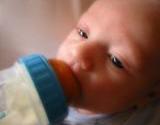Main Menu
Breastfeeding and Alcohol Consumption
Can you drink alcohol when you’re breastfeeding, and if so, how much is too much?
Current medical wisdom holds that it’s OK to drink one or two glasses of wine a week when you’re nursing. While less than two percent of alcohol will make it through your breastmilk to your baby, it’s wise not to breastfeed for two to three hours after having an alcoholic drink.
It’s often said that if you drink alcohol, you should “pump and dump” before nursing your baby – in other words, you should express your milk by using a breast pump, and then discard the milk. This is a myth: pumping and dumping doesn’t help eliminate alcohol from milk. The alcohol will stay in your system, and thus in your breastmilk, for as long as it usually does, even if you pump.
Some say that drinking certain alcoholic beverages, such as Guinness, can help boost your milk supply. Some mothers swear Guinness has been a boon to their milk production, and medical research suggests beer may raise levels of the hormone prolactin, which stimulates milk supply. Since this is also the case with nonalcoholic beer, this effect could be due to the barley in beer. It’s not due to the ethanol found in alcoholic drinks, since other studies have indicated that alcohol consumption can make it harder for milk to let down, and actually decrease milk production. Light drinking may make your baby sleep less; heavy drinking could lead to drowsiness, weakness and very deep sleep. If you drink one or more units of alcohol every day, your baby may experience delays in gross motor development.
Your baby’s age dictates how well he or she can process alcohol in milk. Newborns’ livers are more immature, so they metabolize alcohol much more slowly. It takes a baby about twice as long as an adult to process alcohol: at three months of age, babies begin metabolizing alcohol faster.
This information is solely for informational and educational purposes only. The publication of this information does not constitute the practice of medicine, family planning, child psychology, marriage counseling and this information does not replace the advice of your physician or other health care or mental health care provider. Neither the owners or employees of NaturalFamilyOnline.com or the author(s) of site content take responsibility for any possible consequences from any treatment, procedure, exercise, dietary modification, application of medication or any other action involving the care of yourself or any family members which results from reading this site. It is always best to speak with your primary health care provider before engaging in any form of self treatment. Additional information contained in our Legal Statement


